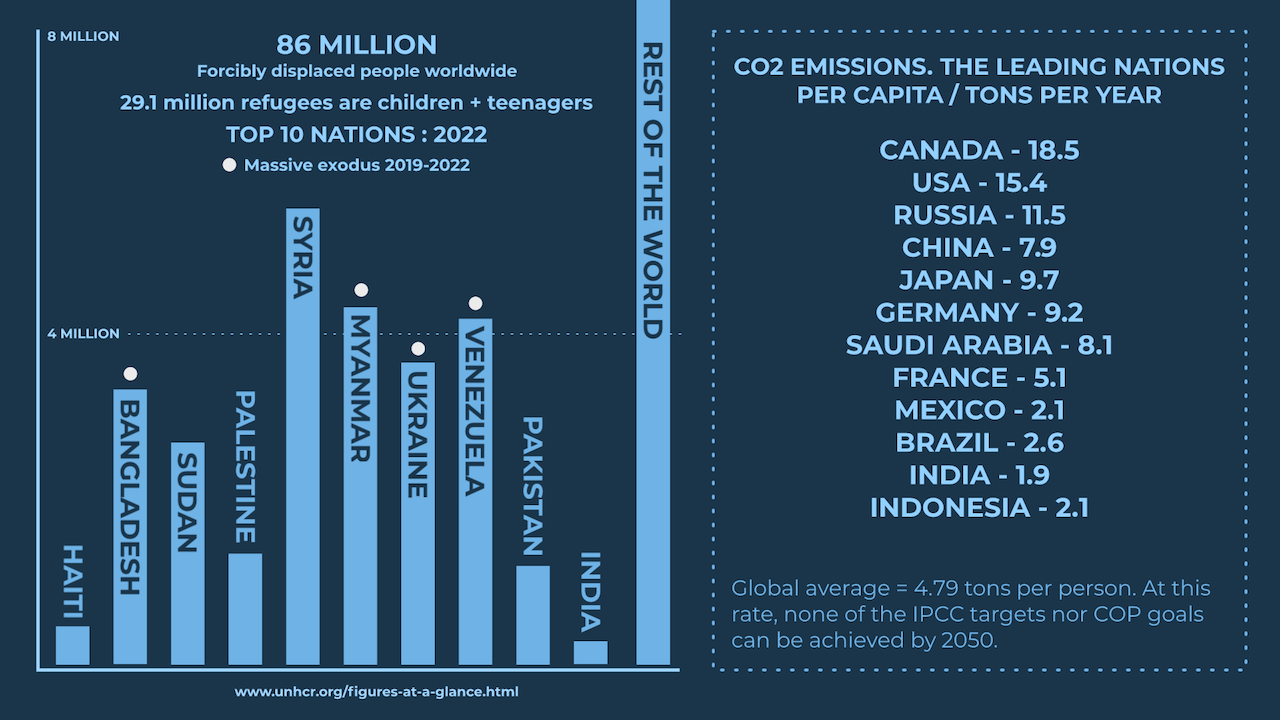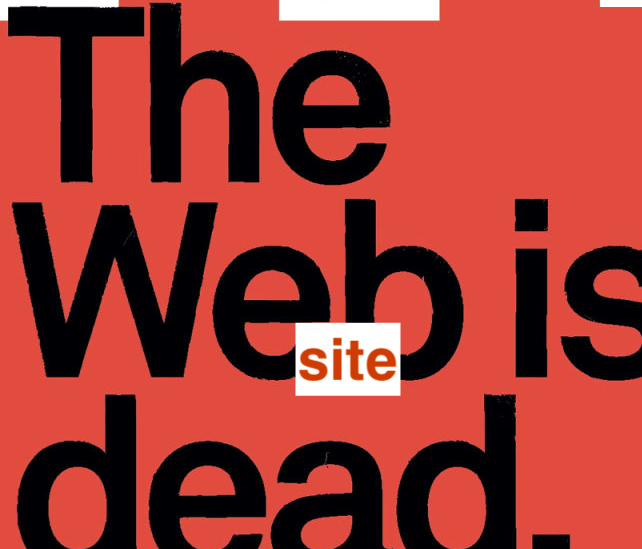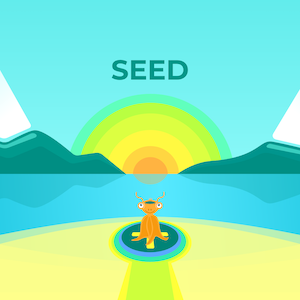"The dislocation of people due to climate change is intertwined with international justice, borders and race. With global climate disorders, borders make for prisons eventually. The best example of this is the United States, where a continuous proliferation and racial migration has taken place for more than 400 years now, steadily destroying the ecosystem and wiping out the first peoples..." states Dr. Maxine Burkett an environmental scientist and UN envoy based in Hawaii. Her argument exposes the double standards of climate justice. She urges that citizens of the global south have to take rapid resilient steps, to secure their near term future, against incoming disasters as well as the vicious shackles imposed by the global north. Local movements, locally controlled, adding up to a collective resistance. "Racial bias is playing out within most dominant discourses" of environmentalism, new energy and the refugee crisis, states Maxine.
"Dynamics which shape the major negotiations around environment, emissions and extraction are mostly framed in the global north, impacting the global south in multiple negative ways. Walls and treaties are unable to contain exodus and climate change. More than 50 islands in the Pacific, nations across Asia, Africa and Latin America now beg for economic revisions, aid and justice... Even a 2 degree change in global temperature will set of failures on multiple levels in the global south and north...which neither regions have the capacity to combat" states Maxine at a recent lecture, explaining the history and racial basis of global exodus. Not just effecting poor people in far away nations, but eventually us all, yet depending how we manage the incoming disruption and use up our temporary privileges.
Our impotency to think and act better is masked by technology. Always hedging our bets on "big techno fixes" that serve the status quo. Professor William Rees indicates with clarity, about the dilemma of hope based on technology. "Most of the net-zero targets for 2050, set by leading industrial nations, are betting on non-existent technology. With great hopes that such systems will be invented in the coming years. That world view at best maintains a status quo, not investing enough on disaster management policies. Thus not ensuring any tangible security for future generations. We are operating a giant mal-adaptive social construct... we cheer the leaders and policy makers who serve capitalism, while muting local needs and opinions, which makes us all complicit in this trajectory of terrible consequences. Hardly anyone can resist the ethics of unlimited growth, however flawed and short term..." states Rees at a recent online presentation, slamming our innate nature, which discounts eminent future threats while embracing temporal solutions.
Now that the age of 'big oil' is winding down, we are out to embrace solar, wind and green lifestyles. As the promises of infinite growth have failed, we make space for angry climate activists, teenagers and children. Now that the emancipation of human beings imagined by Aristotle, Hegel and Marx has turned to dust, we embrace the 'Shambhala' and indigenous spirituality. Now that mainstream science is stifled with contradictions, we turn to the sacred and the magical?
"When we face information and outcomes which do not match our given knowledge, we deny, discredit and even forget such realities..." (J. Wexler, Brain and Culture 2006) "Things will get worse at this rate... One can see at a macro level, that politics and culture is mainly influenced by neoliberal ideology, magical thinking, religious fundamentalism and anti-intellectualism. The current specter can be felt across Europe, North America and many leading nations. This so called age of 'post truth', is indeed a reflection our inability as a species, collectively speaking, to deal with multiple emergencies... objective facts do not shape public opinion anymore..." says Professor Rees.
While Professor Rees illuminates a dark future for humanity, he eventually concludes on a positive note. The importance of defining biophysical limits. The carrying capacity of the earth - which has the final say about our long term existence. Rees insists on placing biophysical limits on major aspects civilization - economics, population, industry and emissions. Pretty much everything we consume in our daily lives. If the entire human population could "afford" the lifestyle (counting emissions) of an average Canadian, American or Russian, we require four earth like planets to sustain that demand (sorry but there's only one earth). 8 billion people are currently living on a nearly exhausted ecosystem. It's obvious that the living planet is not regenerating enough to host more people. 11% of the world's population emitting as much CO2 as the combined 89%.

Labelled as "sacrifice zones" by popular author and ardent critic of capitalism, Naomi Kline refers the vast habitable spaces across the world, that contain billions of people, speaking thousands of languages with a rich diversity of practices and traditions. Mostly powerless to "mainstream economics and gangster capitalism". Thousands of communities are being gradually destroyed and dislocated, to make way for development or as Naomi Kline says "the last wipe out of the planet's reserves". What could not be ripped out and vanquished by 500 years of colonization and industrialization is now being steadily sequestered in the name of progress and green technology. "Places of imperial extraction, these sacrifice zones, where capitalism and environmentalism are at war presently. Racial minorities, lower class communities, tribes and all those who's voice is ignored by mainstream ideology. This exclusion has lead to a big conflict, as economics and industry is crushing those very people who are protecting various ecosystems. Around the world, environmental protectors are being attacked and murdered. If only Elon Musk could buy out Columbia for all it's worth, the Nickel, Zinc and Copper. Hence, colonization is still going on... The destruction of the amazon forest is not just about deforestation, when we see how the remaining tribes view the legacy - of invasion, colonization, genocide and extraction... a timeline that stretches for more than 500 years. However, indigenous people of Amazon have persisted, in small numbers, and they present a great example of resilience, loyalty to earth systems and unity..." states Jason Hickel.
In his new book 'Less is More', Hickel puts out a radical manifesto, or call it direction of resistance: Degrowth. As a veritable practice (not just theory) aimed at the individual, to create reform, transition and stability. Hickel's central argument is based on the roots of capitalism, linked to imperialism, racism and endless extraction. The demand to divest from that destructive legacy is coupled with the logic to invest in regenerative life systems. In less than 200 years, our civilization has reached a stage of overshoot, which if not halted, will definitely lead to near term collapse. "If we want to have a shot at halting the crisis, we need to slow down and restore the balance. We need to change how we see nature and our place in it, shifting from a philosophy of domination and extraction to one that’s rooted in reciprocity and regeneration."
Degrowth in essence is eco-socialism. Some may see it as radical intervention and some as just an antonym of growth. For once, we can ignore the increase of GDP annually - boycott and divest the "holy sacraments" of policymakers, the dominant culture and economic pundits. Recognize the enemy we are fighting. It's not people and it's not the climate. It's the system and our parasitical relationship with the planet. We have to explore our own ontology in order to discover new directions, while abandoning certain old maxims. Otherwise we are part of the ecocide! That wealth and constant growth of capital cannot deliver the promise of happiness and a stable future.
"What is it that has enabled life on earth to persist
for 350 million years, through every kind of catastrophe, every climate change
that’s ever happened on this planet... what might we learn from that? As species we have persisted for 3 million years and that is not about technology, economics nor science...” quoting from the introduction of a charter put forward by Robin Wall Kimmerer, scientist and author of 'Braiding Sweetgrass'. She insists on “being small, staying small and giving more than we take, always
work with natural law ... the value of sticking together, in order to ensure a stable future...” Drawing on her life as an indigenous scientist, Kimmerer
shows how other living being, plants, birds, fish and animals - offer us gifts and lessons,
even if we’ve forgotten how to hear their voices. She says "that vital relationship and giving back to nature's generosity has to be rekindled".
Towards the central
argument : that the awakening of ecological consciousness
requires acknowledgment, protection and celebration of nature. Lets bring the two lenses of knowledge together? That life can be as spiritual and as scientific. Personal growth and material growth have to part ways. Can we hear the languages of other beings? Can we feel the "dying planet" yet? Will we be able to "honor the generosity of the earth?" and perhaps carry it forward, for the future generations of all that remains living.































0 -